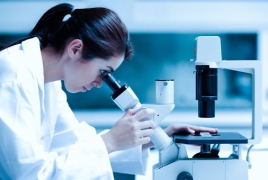NIH might start funding human-animal chimera studies August 5, 2016 - 14:55 AMT PanARMENIAN.Net - The NIH could start funding experiments that inject human stem cells in animal embryos to create hybrids called "chimeras". It issued a blanked ban on chimera research last year, but it looks like the organization changed its mind after examining the science behind it and talking to lead experts in the field. Carrie D. Wolinetz, NIH's Associate Director for Science Policy, wrote in a blog post that the "formation of these types of human-animal organism, referred to as "chimeras," holds tremendous potential for disease modeling, drug testing and perhaps eventual organ transplant", Engadget said. While the NIH is now more open to the possibility of creating hybrids for disease research and organ transplants, that doesn't mean it's funding even studies that could lead to our sci-fi-esque apocalyptic end. To start with, it still wouldn't earmark money for experiments aiming to develop and breed animals with human sperm and egg cells. It also plans to form a committee tasked with examining every study that falls into these two areas of research: first is the type that introduces stem cells into non-human vertebrate embryos. Scientists will be allowed to inject cells into embryos before the animals' organs start developing, so long as they're not experimenting on non-human primates like chimpanzees. Anybody working on monkeys or chimpanzees will have to wait until the embryos are further along. The second area of research the committee will keep a close eye on is introducing stem cells into animals to grow organs for transplant. In at least one previous experiment, researchers were able to grow rat pancreas in a mouse that lacks the genes to grow them. Scientists are hoping to replicate that feat on pigs. If they could grow, say, human liver or kidneys in pigs whose genes were tweaked not to grow them, then the organs could eventually be transplanted into human patients. As you can imagine, though, studies like these raise a lot of ethical concerns, Engadget said. What if the stem cells turn into part of the animal's brain and it ends up developing a consciousness comparable to ours? "What makes us human?," Jeffrey P. Kahn, the director of the Johns Hopkins Berman Institute of Bioethics, asked The New York Times. "Is it having 51 percent human cells?" He explained people's concerns to the publication, one of which is the possibility of creating chimeras that are more human than not. The NIH is now seeking public comments on its proposal. Yerevan will host the 2024 edition of the World Congress On Information Technology (WCIT). Rustam Badasyan said due to the lack of such regulation, the state budget is deprived of VAT revenues. Krisp’s smart noise suppression tech silences ambient sounds and isolates your voice for calls. Gurgen Khachatryan claimed that the "illegalities have been taking place in 2020." Partner news |